Constants
A constant in mathematics is a fixed value that does not change. It is a quantity that remains unchanged throughout a given problem or mathematical equation. Constants are used in various mathematical contexts, including algebra, geometry, calculus, and physics. Understanding constants is crucial in solving mathematical problems and formulating mathematical expressions.
Types of Constants
There are different types of constants in mathematics:
- Numeric Constants: These are specific numerical values, such as 3, 5, 7, or π (pi).
- Physical Constants: These are constants that represent physical quantities, such as the speed of light (c), gravitational constant (G), or Planck's constant (h).
- Mathematical Constants: These are special mathematical values, such as e (the base of the natural logarithm) or φ (the golden ratio).
Examples of Constants
Here are some common examples of constants:
- π (pi): The ratio of the circumference of a circle to its diameter, approximately equal to 3.14159.
- e (Euler's number): The base of the natural logarithm, approximately equal to 2.71828.
- Speed of Light (c): A physical constant representing the speed at which light travels in a vacuum, approximately 299,792,458 meters per second.
- Gravitational Constant (G): A physical constant used in Newton's law of universal gravitation, approximately 6.674 × 10-11 N m2 kg-2.
Study Guide
To understand and work with constants effectively, consider the following study guide:
- Identifying Constants: When solving mathematical problems, identify the constants involved and understand their significance in the context of the problem.
- Using Constants in Formulas: Learn how to use constants in mathematical formulas and equations. Understand how they affect the behavior and outcomes of the equations.
- Unit Conversion: Pay attention to the units associated with physical constants. Understanding unit conversions is essential when working with physical constants in physics and engineering problems.
- Memorizing Common Constants: Familiarize yourself with common mathematical and physical constants, such as π, e, and fundamental physical constants. Memorizing these values can be beneficial in problem-solving.
- Application in Real-World Scenarios: Explore how constants are used in real-world applications, such as physics, engineering, finance, and computer science. Understanding the role of constants in practical situations enhances their relevance and importance.
By mastering the concept of constants, you will develop a stronger foundation in various mathematical disciplines and be better equipped to tackle complex problems.
.◂Math Worksheets and Study Guides Seventh Grade. Nonlinear Functions and Set Theory
Study Guide Nonlinear Functions and Set Theory
Nonlinear Functions and Set Theory  Worksheet/Answer key
Worksheet/Answer key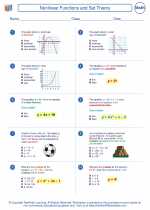 Nonlinear Functions and Set Theory
Nonlinear Functions and Set Theory  Worksheet/Answer key
Worksheet/Answer key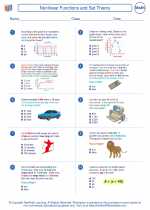 Nonlinear Functions and Set Theory
Nonlinear Functions and Set Theory  Worksheet/Answer key
Worksheet/Answer key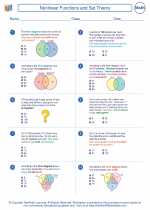 Nonlinear Functions and Set Theory
Nonlinear Functions and Set Theory  Worksheet/Answer key
Worksheet/Answer key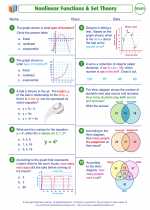 Nonlinear Functions and Set Theory
Nonlinear Functions and Set Theory  Worksheet/Answer key
Worksheet/Answer key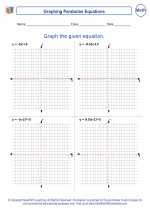 Parabolas
Parabolas 

 Worksheet/Answer key
Worksheet/Answer key
 Worksheet/Answer key
Worksheet/Answer key
 Worksheet/Answer key
Worksheet/Answer key
 Worksheet/Answer key
Worksheet/Answer key
 Worksheet/Answer key
Worksheet/Answer key

The resources above cover the following skills:
Algebra (NCTM)
Represent and analyze mathematical situations and structures using algebraic symbols.
Explore relationships between symbolic expressions and graphs of lines, paying particular attention to the meaning of intercept and slope.
Analyze change in various contexts.
Use graphs to analyze the nature of changes in quantities in linear relationships.